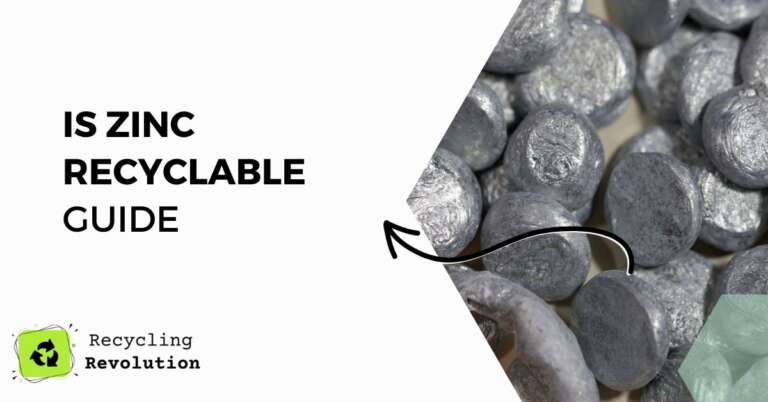Zinc is a metal and a mineral. Zinc is used in foods and beverages, pharmaceuticals, paints, rubber, steel alloys and batteries. As the demand for recycled zinc materials has increased so has the numbers of businesses that offer recycling solutions such as providing metal scrap recycling services. Recycling zinc is important because it prevents the pollution of our air, land, water or soil.
Less energy is required to extract zinc from its ore or production forms, so recycled metals are generally less energy-intensive to process than their virgin counterparts.
Can you recycle Zinc?
Zinc is one of the most versatile and extremely useful metals. It has many great properties including high strength, corrosion resistance, and outstanding alloys with other metals, or with nonmetals. It is lightweight, ductile, and can be easily alloyed with other elements.
Zinc is an essential component of many consumer products that are in use every day. However, it’s heavily used in the building and construction industry. You’ll find zinc in things like PVC rain gutters and downspouts, shingles, and awnings. It’s also in toys, baby cribs and bed rails, building materials such as galvanized steel, plumbing pipes and brass fittings.
Zinc is very much recyclable. It’s one of the few metals that can be recycled over and over again without losing any quality. There are two main types of zinc, the pure form and an alloy. Pure zinc is usually reserved for industrial purposes and is used in products such as brass fittings, screws, electronics and batteries.
Zinc alloys are used in products such as galvanized steel, casters, and curtain rods. That said, it is a very valuable metal for recycling services because it can be recycled to reclaim the zinc as well as any other metals that are used to make the item in question.
How is Zinc recycled
Zinc recovery is the process by which zinc is recovered from an object or material and reused or recycled. It’s also referred to as Zinc reclamation and is the process of recovering zinc waste (Zinc scrap), then converting that waste into a different product or material. Zinc scrap is recycled materials that are separated from their waste stream, such as at a recycling center.
The majority of zinc scrap comes from zinc oxide production factories, paint manufacturing factories and other industries requiring large quantities of the metal. These industries are able to recover 75% to 85% of their scrap before it enters the landfill.
Electric Arc Furnace is one of the commonly used Zinc recycling methods. It involves melting down scrap metal to extract the zinc. The scrap metal is melted into a volatile form and then is heated in an electric furnace to a temperature above the melting point of zinc. This converts it into zinc dust, which is then suspended in a gas stream by the use of a separation system. The zinc dust is blown into a collection chamber where it dissolves into Zinc oxide.
Electromagnetic Separation is another method of Zinc recycling. It involves using a magnet to separate the metals by what they are made of. Magnetic separation has become increasingly popular because it’s one of the few ways to recycle nonferrous metals such as zinc without re-melting them.
The benefits of recycling Zinc
There are many benefits of recycling zinc. It’s a great resource in helping to conserve natural resources, the conservation of energy and its ability to help create cleaner air and water. Recycling can also be an effective way for companies to reduce their environmental footprint as well as give them an added marketing advantage over competitors that may not have any type of recycling program in place.
One of the great benefits of recycling is that it can conserve and replenish some of the Earth’s natural resources. In today’s economy, many companies look for ways to save a penny or two. Recycling is one of the easiest ways to do this because it allows you to use less raw material, thus reducing your costs.
The energy required to produce virgin is much more than recycled Zinc thereby making it a greener solution for anyone that recycles their scrap materials.
Also, recycling zinc reduces the amount of greenhouse gases released into the atmosphere through the production, processing and disposal of the recycled zinc. Recycling also enables a reduction in the size of our valuable landfills and encourages a practice that reduces pollution when comparing this alternative process to dumping unwanted material into landfills.
Think of how many landfills are in your area and how often they are “full.” Air pollutants are lessened because recycling Zinc prevents the emission of carbon dioxide, sulfur dioxide, nitrogen oxide and other pollutants. This fact alone is a huge benefit to everyone.
Landfills can be an environmental hazard to nearby residents and their groundwater supplies, even if it’s contained. You’re doing the environment a big favor, too. Recycling Zinc is one of the simplest, most cost-effective ways to help create a cleaner environment.
Final Thoughts
Zinc, like many other metals is a very useful material and there are many ways to recycle it. It’s very important that we continue to recycle this valuable material as it can be recycled over and over again with no loss of quality. This is an excellent example of how recycling can help us conserve our natural resources and do our part in being better stewards of the environment.
FAQs
Is Zinc environmentally friendly?
Yes, it is. Zinc is a very useful material and can be recycled many times. This helps conserve natural resources and reduces energy consumption.
Is Zinc infinitely recyclable?
Yes, it is infinitely recyclable. You can recycle it as many times as possible without the metal losing its properties.

